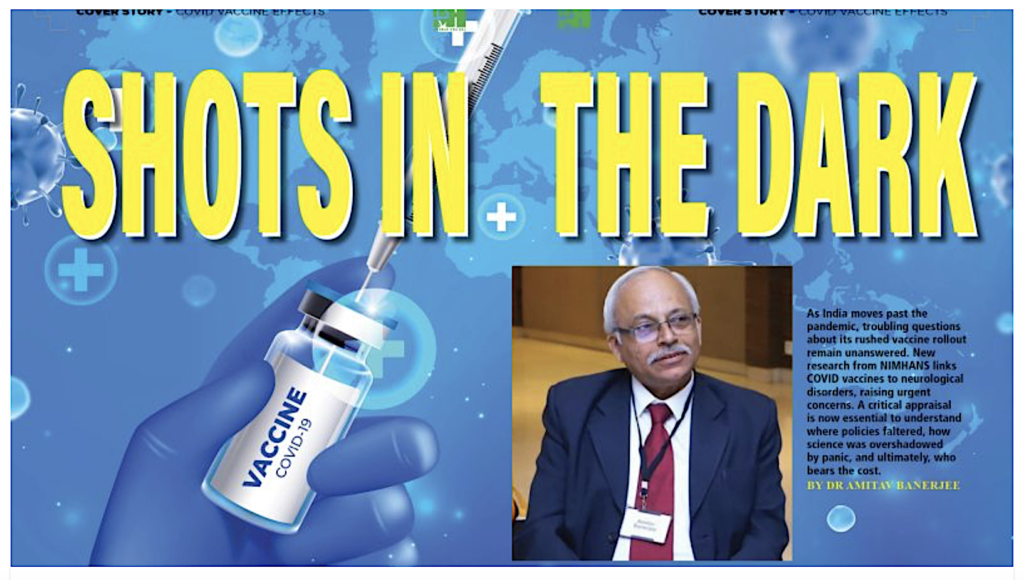NIMHANS Bengaluru Research Fuels Urgent Call for Critical Appraisal of India’s COVID-19 Vaccine Rollout Amidst Neurological Concerns

As India emerges from the immediate grip of the COVID-19 pandemic, unsettling doubts about its fast and wide vaccine rollout are returning, triggered by new research suggesting a link between COVID-19 vaccines and neurological conditions. Dr Amitav Banerjee’s analysis, “SHOTS IN THE DARK,” makes an urgent case for a transparent reassessment of public health policy and vaccine safety.
Dr.Banerjee’s analysis outlines serious concerns that arose during the COVID-19 vaccination drive in India. Early studies, including those from the Indian Council of Medical Research (ICMR), habitually downplayed risk. However, public alarm was reignited when the Chief Minister of Karnataka connected sudden deaths to vaccinations, prompting a noticeable increase in cardiac health consultations and public anxiety.
Dr. Banerjee’s paper raises profound dilemmas related to mass vaccination, especially considering the pandemic’s extremely low lethality rates among healthy younger people (0.0003% for 0-19 and 0.03-0.07% for those up to 69 years). He points out that the Federal Drug Authority in Europe recommended pausing the Covishield (AstraZeneca) vaccine for those under 50 due to increased risk of clotting disorders, yet 85% of people in India are below 50. We note that by June 2021, sero-surveys were showing that 68% of the population had developed natural antibodies, which was developing quicker than their vaccinations, which was one reason they questioned if there was still a need for urgency around vaccinations.
His analysis points to several “red flags” which have gone un-researched, including an unusual spike in sudden deaths due to heart attacks and cardiovascular issues coinciding with the vaccination rollout, especially amongst young and healthy people. These events coincide with other international trends, such as the rise of death rates, correlating national mortality rates with vaccination rollout in Australia, and the U.S. death rates show increases in sudden deaths by 84% in 25-44 year olds after mass vaccination rates over a July weekend.
Casting a critical eye on governmental studies, Dr. Banerjee’s paper calls out the ICMR for “hasty processes” and low-grade case-control studies rather than randomized controlled trials (RCTs). He argues that design flaws, such as overmatching the control groups, may have “masked possible vaccine-related harms,” which led to incorrect conclusions that vaccines protected against sudden deaths.
The paper calls for immediate attention in light of growing reports, notably NIMHANS Bengaluru data, reports of possible neurological effects from COVID-19 vaccines. The paper issued a clear “Research Call to Action,” reiterating the need for continued monitoring comparing vaccinated to unvaccinated cohorts, and to conduct appropriate, long-term studies without conflicts. The analysis emphasizes that alarming concerns about the quality and transparency of governmental studies could “erode public trust” in important health guidance. The report emphasizes, “human lives are more important than economic interests.”
“As a nation, we need to conduct a critical evaluation of where we got everything wrong, how science was eclipsed by fear, and who is ultimately going to pay the price,” suggests Dr Amitav Banerjee. “Our investigation highlights these issues and shows how much more integrative reasoning is needed in medicine, and how much better safety assessments in public health need to be robust and transparent, to ensure that more health catastrophes do not replicate the errors of the past, and to restore public confidence in our medical systems.”
The paper emphasizes the crucial need for careful systematic review of data to protect the health of the public and illustrates many of the issues associated with public health policies, vaccinations, and processes that should be taken into account to preserve integrity and trust in the medical systems.
Ref: https://www.doublehelical.com/?p=7425

Dr. (Prof) Amitav Banerjee, Epidemiologist
Universal Health Organisation (UHO), Chairman
Postdoctoral in epidemiology, who was a field epidemiologist for over two decades in the Indian Armed Forces. He also led the mobile epidemic investigation team at the Armed Forces Medical College, Pune, India, from 2000 to 2004. During this period, he investigated a number of outbreaks in different parts of the country. He was awarded for his work on Tribal Malaria and Viral Hepatitis E. He is presently a Professor in a Medical College in Pune
Dr Amitav Banerjee is an internationally recognised Professor of Community Medicine from India. In 2023, he was included in the top 2% of the Stanford University Rankings Scientists Database.
Dr. Amitav Banerjee has a distinguished research career spanning over four decades. His substantial body of work encompasses critical investigations into epidemics, including typhoid, hepatitis, respiratory infections, and pneumonia.
Also Read:
Latest Newsletters:
